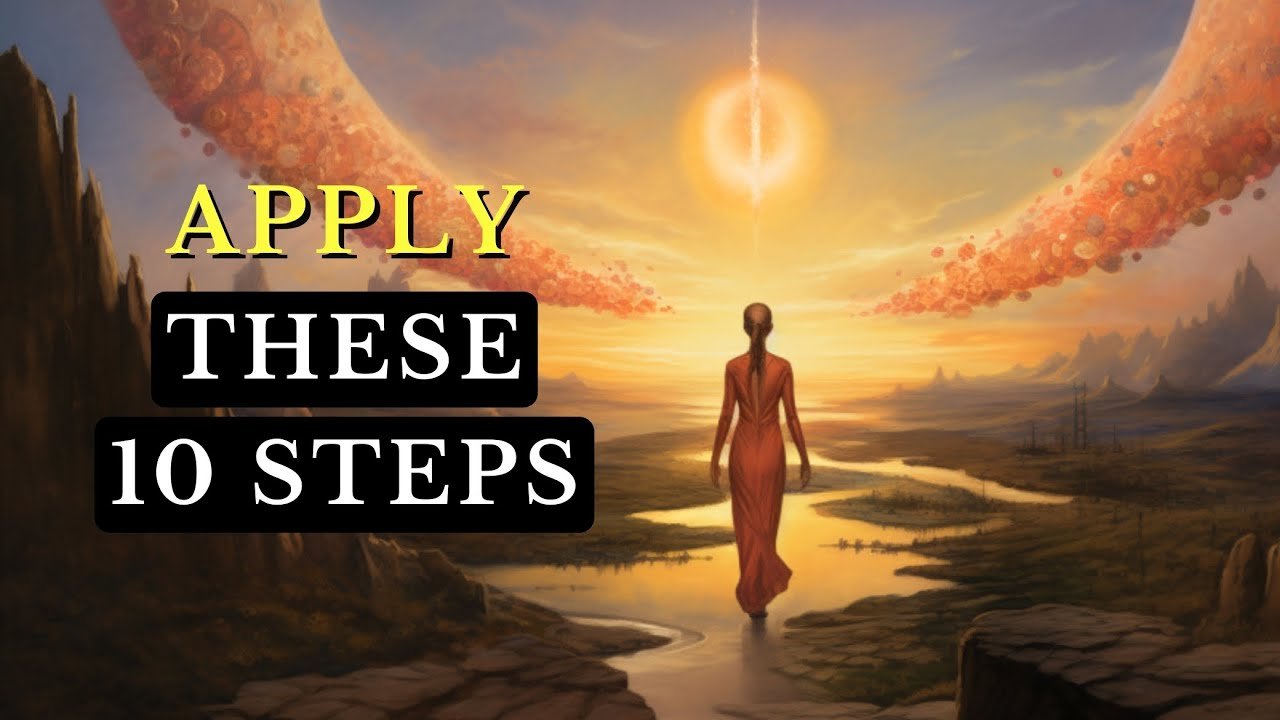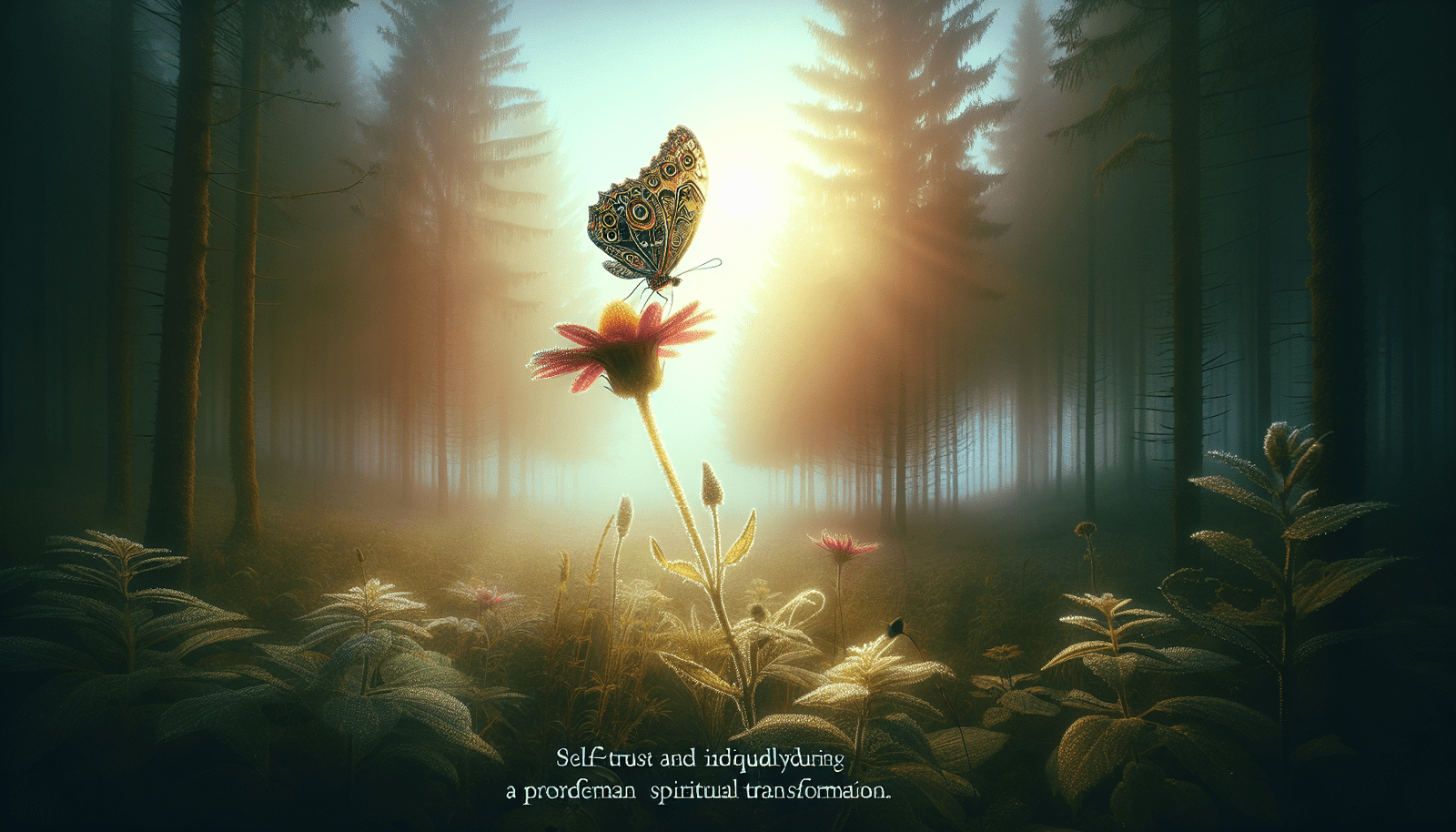The journey of spiritual awakening is a beautiful, transformative process that encourages you to embrace both self-trust and your unique path through life. At its core, this journey involves experiencing profound shifts in consciousness, offering you a deeper understanding of life’s interconnectedness. It’s not about reaching a final destination but rather about being present in the moment and breaking free from the narratives of past and future. By following the ten guidelines outlined in the video, you can cultivate a meaningful presence, ease overthinking, and learn to appreciate the intricate tapestry of your experiences.
Through spiritual awakening, you’ll come to view thoughts and sensations as fleeting and impersonal, helping you recognize yourself as the space for experiences rather than their controller. Embracing discomfort with dignity and accepting all emotions as part of your reality will nurture your growth. The focus is on the journey itself, acknowledging that each stumble signifies progress and that each person’s path is distinct. By celebrating your uniqueness and accepting where you are, you align more closely with your true self, setting the stage for profound healing and self-discovery.
Understanding Spiritual Awakening
Defining Spiritual Awakening
A spiritual awakening is an experience that transcends ordinary understanding, allowing you to explore a deeper sense of life’s mysteries and the connectedness of all things. It involves profound shifts in consciousness where you become more aware of your true self and your place in the vast tapestry of existence. This awakening is a continuous invitation to live life with openness and curiosity, embracing each moment without getting entangled in narratives of past mistakes or future anxieties. Contrary to the belief that it is reserved for a select few, spiritual awakening is accessible to anyone willing to embark on this journey of self-discovery.
Recognizing Shifts in Consciousness
As you undergo a spiritual awakening, you may notice significant shifts in how you perceive and interact with the world. These shifts often manifest as a deeper connection with your inner self and a heightened awareness of the present moment. You begin to notice the illusion of separation between you and the universe dissolving, replaced by a profound sense of unity. You might experience a heightened sense of peace, joy, and compassion, accompanied by a reevaluation of previously held beliefs and societal conditioning. These changes reveal that life is richer and more complex than the surface-level reality you once assumed.
The Role of Interconnectedness in Spiritual Growth
Interconnectedness is at the heart of spiritual growth. In recognizing that all life forms are entwined, you begin to see yourself as part of a larger whole, fostering empathy and compassion for others. This awareness encourages a shift from selfish pursuits to ones that benefit the broader community, guiding you toward actions and thoughts that support harmony and balance. The understanding that your journey is inextricably linked to others inspires a deeper sense of purpose and fulfillment, enhancing your spiritual evolution.
The Journey of Self-Trust
Trusting Oneself Amidst Transformation
Amidst the transformative journey of spiritual awakening, learning to trust yourself is essential. As your old beliefs and habits are questioned, you may feel uncertainty or self-doubt. However, trusting your inner wisdom provides a stable foundation, allowing you to navigate through changes with confidence and resilience. Embracing trust in your instincts not only supports you during challenging times but also opens the door to greater self-discovery and authenticity.
Moving Away from Past and Future Narratives
A crucial aspect of self-trust involves releasing the grip of past and future narratives. Often, we are caught in loops of regrets and anxieties, which cloud our perception of the present. By deliberately shifting focus to the now, you learn to let go of paralyzing stories, empowering yourself to embrace life’s unfolding experiences without the baggage of assumptions. This shift fosters a sense of freedom and clarity, enhancing your ability to respond to life’s challenges with grace and ease.
The Power of Presence in Enhancing Self-Trust
Presence is a powerful tool in fostering self-trust. By anchoring yourself in the present moment, you cultivate a deep sense of awareness and mindfulness, which strengthens your trust in the here and now. This awareness dissolves doubts and distractions, allowing you to listen to your innate wisdom and make choices aligned with your true self. Through mindfulness, you develop a compassionate relationship with yourself, embracing imperfections and recognizing your intrinsic worth.

This image is property of i.ytimg.com.
Breaking Free from Overthinking
Understanding the Nature of Thoughts
To break free from overthinking, it’s vital to understand the nature of thoughts. Thoughts are transient and impersonal, arising and fading like waves in the ocean of your mind. They do not define who you are, but merely represent passing mental phenomena. Recognizing this helps in reducing the power they hold over you, freeing you from the cycles of worry and rumination that often lead to unnecessary suffering.
Techniques for Reducing Mental Clutter
Several techniques can aid in reducing mental clutter, allowing you to focus on what truly matters. Practices like meditation, deep breathing, and journaling help quiet the mind and provide clarity. Implementing routines that include moments of stillness and reflection can also create space for a more peaceful mental state. By regularly engaging in these practices, you diminish the grip of incessant thoughts and foster a sense of calm and balance.
Harnessing Clarity Through Mindfulness
Mindfulness is a gateway to harnessing mental clarity. By paying attention to the present moment with curiosity and non-judgment, you cultivate an environment where clarity naturally arises. Mindfulness allows you to observe thoughts and sensations without getting entangled in them, promoting an attitude of acceptance and openness. This practice nurtures a clear and focused mind, empowering you to navigate life with intention and purpose.
Embracing Impersonal Thoughts and Sensations
Viewing Yourself as a Vessel for Thoughts
Understanding yourself as the space for thoughts, rather than their creator, is liberating. This perspective allows you to observe thoughts as neutral entities that drift through your awareness. By detaching from the need to control or define yourself by them, you cultivate a sense of peace and expansiveness. This shift in perception acknowledges your role as the witness rather than the thinker, opening up a path to deeper self-understanding and freedom.
Recognizing the Transitory Nature of Emotions
Emotions, like thoughts, are transient and ever-changing. Recognizing their fleeting nature helps alleviate the pressure to suppress or cling to them. By allowing emotions to exist without judgment, you accept them as natural expressions of your experience. This acceptance creates an internal environment where emotions can flow freely, eventually dissipating as they arise, leading to a deeper sense of inner peace and resilience.
Strategies for Detachment and Acceptance
To successfully detach from thoughts and emotions, cultivate a practice of acceptance without judgment. Begin by acknowledging each thought and emotion as it arises, viewing them as temporary guests in your awareness. Techniques such as mindful breathing and visualization can aid in maintaining a sense of detachment, allowing you to observe without becoming overwhelmed. These strategies foster a compassionate and patient approach, encouraging a state of inner equilibrium and contentment.

Dignifying Discomfort and Pain
Gaining Wisdom from Challenges
Challenges are innate to the human experience, and learning to view them as opportunities for growth is essential. Discomfort and pain, rather than obstacles, can be seen as teachers that offer valuable lessons and insights. By approaching these experiences with curiosity and openness, you allow yourself to extract wisdom and strength, transforming difficulties into catalysts for personal development.
Accepting All Facets of Experience
Acceptance involves embracing all aspects of your experience, including those that are unpleasant or difficult. Resistance to these facets often creates additional suffering, whereas acceptance allows you to engage with life more fully. By meeting each moment with openness, you acknowledge the fullness of your human experience, leading to a more balanced and enriched existence.
Finding Growth Through Pain
Pain, when embraced with dignity, becomes a powerful vessel for growth. Instead of avoiding or suppressing uncomfortable sensations, breathe into them with compassion and curiosity. This approach honors your pain, granting it the space to teach and transform you. Through this process, you emerge with a deeper understanding and resilience, recognizing that growth often seeds itself in the soil of adversity.
The Essence of Natural Acceptance
Distinguishing Between Acceptance and Resignation
It’s important to differentiate acceptance from resignation. Acceptance involves acknowledging and embracing reality as it is, without attachment to outcomes. Resignation, however, implies giving up or losing hope. True acceptance empowers you to engage with life authentically and proactively, finding peace within circumstances rather than surrendering to them.
Navigating Difficult Emotions Gracefully
Graceful navigation of difficult emotions begins with acceptance. Allow yourself to experience emotions fully, without resistance or attachment. By doing so, you integrate them into your overall experience, fostering a sense of wholeness and inner peace. Practices such as self-compassion and mindful awareness support this process, enabling you to move through emotional challenges with ease and dignity.
Integrating Acceptance into Daily Life
Integrating acceptance into everyday life requires a commitment to mindfulness and presence. Begin by observing moments of resistance or judgment, consciously choosing to replace them with acceptance and understanding. Incorporate moments of reflection and gratitude into your daily routine, cultivating an attitude of openness. This practice gradually weaves acceptance into the fabric of your life, enhancing your overall sense of well-being and fulfillment.

The Present Moment as a Source of Strength
Defining the Present Moment
The present moment is the only reality you truly possess. It exists independent of past regrets or future fantasies, offering a space of clarity and potential. By aligning with the present, you access unparalleled strength and wisdom, enabling you to respond to life from a place of authenticity and presence. The present moment serves as a gentle reminder of your inherent power, grounding you in an ever-changing world.
Practices for Living in the Now
Living in the now involves cultivating practices that anchor you in the present. Techniques such as mindfulness meditation, breath awareness, and gratitude journaling can enhance your ability to remain present. Incorporating these practices into your daily routine fosters a heightened awareness of the beauty and richness of each moment, helping you to navigate life with intention and integrity.
The Benefits of Present-Moment Awareness
The benefits of present-moment awareness are vast and transformative. By grounding yourself in the now, you alleviate stress and anxiety, fostering a sense of peace and calm. This awareness enhances your capacity for compassion and empathy, deepening your relationships with others. Moreover, it empowers you to make choices aligned with your true self, leading to a more authentic and fulfilling life.
Celebrating Individual Uniqueness
The Importance of Self-Acceptance
Self-acceptance is the foundation for celebrating your uniqueness. Embracing who you are, without comparison or judgment, allows you to honor your individual journey and expression. By recognizing that your worth is intrinsic and not dependent on external validation, you cultivate a deep sense of self-love and fulfillment, empowering you to share your gifts and talents with the world.
Recognizing the Distinct Nature of Each Journey
Each individual’s journey is distinct and incomparable. By acknowledging this truth, you release the burden of measuring your progress against others. Embrace the uniqueness of your path, understanding that it’s shaped by your personal experiences, insights, and challenges. This recognition fosters gratitude and appreciation for your own journey, freeing you to live with confidence and authenticity.
Fostering an Environment for Personal Growth
Creating an environment conducive to personal growth involves surrounding yourself with supportive and nurturing influences. Engage in activities that inspire and challenge you, collaborate with individuals who encourage your growth, and cultivate spaces that align with your values and aspirations. By intentionally fostering such an environment, you empower yourself to expand and evolve, unlocking your full potential.
Navigating Setbacks on the Spiritual Path
Understanding Stumbles as Progress
Setbacks are not failures but essential components of spiritual progress. Understand that stumbling along your path offers valuable lessons and opportunities for reflection. Each misstep enhances your wisdom and resilience, guiding you toward deeper self-awareness and growth. By viewing setbacks as integral to your journey, you cultivate an attitude of perseverance and optimism.
Strategies for Overcoming Obstacles
Overcoming obstacles requires a combination of courage, patience, and curiosity. Approach each challenge with an open mind, seeking to understand its underlying lessons. Employ strategies such as mindful reflection, seeking support from mentors or peers, and practicing self-compassion. By doing so, you transform obstacles into stepping stones that propel you forward on your spiritual path.
Maintaining Motivation Through Challenges
Maintaining motivation through challenges is essential for sustained growth. Remind yourself of your core values and intentions, focusing on the larger purpose behind your journey. Surround yourself with sources of inspiration and support, incorporating practices that nurture your spirit and resilience. By staying connected to your inner vision, you remain motivated and engaged, even amidst adversity.
Concluding Reflections on the Journey
The Continuous Nature of Spiritual Awakening
Spiritual awakening is not a destination but a continuous journey of exploration and discovery. It unfolds in layers, revealing deeper insights and understanding as you progress. Embrace the ongoing nature of this journey, recognizing that each moment offers an opportunity for growth and transformation. By approaching your path with openness and curiosity, you invite infinite possibilities into your life.
Integrating Lessons into Everyday Life
The true value of spiritual awakening lies in integrating its lessons into daily life. Apply the insights and wisdom gained along your journey to your relationships, work, and personal development. Practice mindfulness, compassion, and presence in all your interactions, embodying the principles of your awakening in each aspect of your existence. Through integration, you create a harmonious and fulfilling life aligned with your authentic self.
Embracing the Journey with Openness and Curiosity
Approach your spiritual journey with openness and curiosity, embracing each experience as an opportunity for growth. Release the need for certainty or predetermined outcomes, allowing yourself to explore and evolve naturally. By maintaining an attitude of curiosity, you remain receptive to the limitless possibilities that life offers, discovering new depths of understanding and fulfillment along the way.

